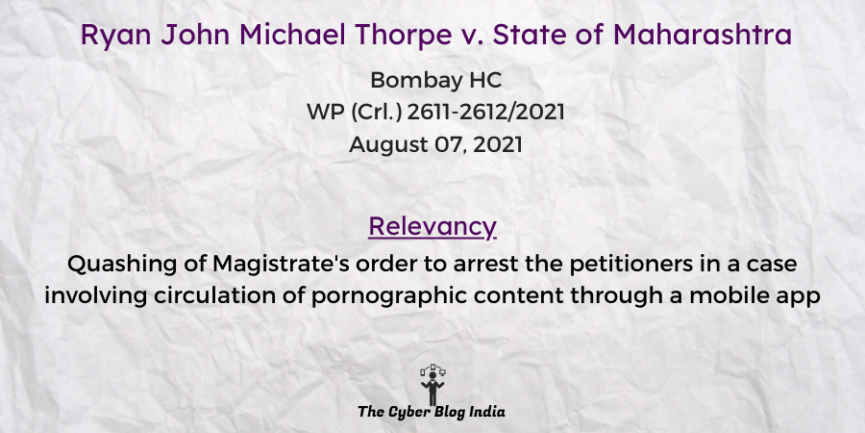Ryan John Michael Thorpe v. State of Maharashtra

Ryan John Michael Thorpe v. State of Maharashtra
In the High Court of Bombay
WP (Crl.) 2611-2612/2021
Before Justice A.S. Gadkari
Decided on August 07, 2021
Relevancy of the case: Quashing of Magistrate’s order to arrest the petitioners in a case involving circulation of pornographic content through a mobile app
Statutes and Provisions Involved
- The Information Technology Act, 2000 (Sections 66E, 67, 67A)
- The Indecent Representation of Women (Prohibition) Act, 1986 (Sections 3, 4, 6, 7)
- The Code of Criminal Procedure, 1973 (Section 41, 41A, 482)
- The Indian Penal Code, 1860 (Sections 34, 292, 293, 354C, 420)
Relevant Facts of the Case
- The investigation into a crime revealed that the petitioners, Ryan Thorpe and Raj Kundra, circulated pornographic content through an app, “Hotshots”. The second petitioner maintained the app through his company.
- The police searched the above company’s premises with due permission, seized electronic gadgets, and directed the second petitioner to sign a search.
- After that, the investigating officer served the petitioners with notices under Section 41A of the Code of Criminal Procedure, 1973, and called them for investigation. While the first petitioner accepted and acknowledged the notice, the second petitioner refused to accept it.
- Furthermore, the petitioners attempted to destroy incriminating material. The police subsequently arrested them upon receipt of an order from the Additional Chief Metropolitan Magistrate, who remanded the petitioners to police custody.
- The petitioners have challenged the Magistrate’s order.
Prominent Arguments by the Advocates
- The first petitioner’s counsel argued that:
- Ryan had accepted the notice issued by the police. Thus, Section 41A(3) would apply. There is no case for non-compliance of the order.
- The concerned officer’s affidavit and the second remand report had discrepancies regarding the destruction of evidence.
- His arrest was wrong in law as the police did not comply with the spirit of Section 41A(3) of the Code of Criminal Procedure, 1973.
- The second petitioner’s counsel argued that:
- The Supreme Court’s directive in Arnesh Kumar v. State of Bihar required the police to provide a two-week prior notice of arrest as per Section 41A. The police’s failure to comply with this directive constituted a violation.
- The petitioners could not have deleted the evidential data in the presence of 22 police officers during the search.
- The remand report and the arrest panchanama did not mention the deletion of data. The investigating officer’s statement alleging the same in the affidavit was an afterthought.
- The respondent’s counsel argued:
- The investigating agency had served a notice and called upon the petitioners to attend its office, but the second petitioner refused to accept the notice. They destroyed incriminating evidence from their devices on the day of the search, which necessitated their immediate arrest.
- The police arrested after the Magistrate’s order, which was made after perusing the case diary and the remand order.
Opinion of the Bench
- The two-week notice requirement would not take effect since the second petitioner refused to accept the notice under Section 41A.
- The case diary indicated that the investigating officer was satisfied with the necessity of the arrests. The Magistrate pursued the diary to record his satisfaction while passing the impugned arrest order.
- The arrest was made to prevent the destruction of evidence related to the petitioners’ arrest.
Final Decision
- The court dismissed the petitions, as the Magistrate’s order did not suffer from any infirmity.
Jyotsna Sood, an undergraduate student at the National Law Institute University, Bhopal, prepared this case summary during her internship with The Cyber Blog India in May/June 2024.
